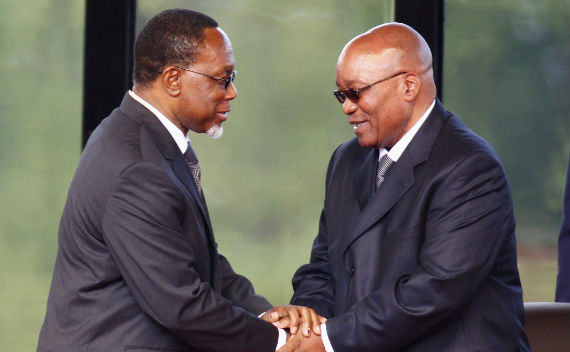South Africa: Kgalema Motlanthe
More on:

South Africa President Jacob Zuma is in trouble politically, with elements within the tripartite alliance—Zuma’s Africa National Congress (ANC), the South African Communist Party (SACP) and the Congress of South African Trade Unions (COSATU)--opposing his re-election next year as party leader. In politics, a year is a long time, and Zuma may well recover, drawing on the formidable power of incumbency. Nevertheless, South Africa’s foreign friends should probably pay more attention to deputy president and deputy ANC leader Kgalema Motlanthe as a possible successor to Zuma as party leader and chief of state.
Motlanthe has been briefly chief of state before, during the interregnum between Mbeki’s 2008 departure and Zuma’s election as president in 2009. The press reports that elements within the ANC Youth League want to endorse him against Zuma, and journalists also speculate about the possibility that he could prevail at next year’s party convention. However, early last month Montlanthe flatly denied that was seeking to displace Zuma. Further, he said he had spoken to no one about his future role, that press speculation was exactly that: speculation.
The ANC puts a premium on loyalty to the party and its leadership, and Motlanthe displayed both characteristics when Mbeki was in power. Subsequently, it was Zuma who appointed Motlanthe deputy president and deputy party leader. With a history of loyalty to the party and its machinery, he may well be reluctant to challenge Zuma now. On the other hand, his leadership credentials are strong. He joined the armed wing of the ANC during the struggle, was arrested, and spent a decade on Robben Island. Subsequently, he was president of the National Union of Mineworkers. To me it is unclear whether he ever formally joined the Communist party. He has publicly despaired about corruption, especially in local government.
Motlanthe was born in 1949 in a Johannesburg township. When he was growing up, he was close to Anglican priests in the Community of the Resurrection, a predominately white order that pioneered social work in some of the black townships. Some of its members were Christian socialists and close to the UK Labour Party. According to Africa Confidential, rather than China, Motlanthe wants to emulate Brazil and India. He is often described as a “left-leaning intellectual,” though it is hard to tell what that label actually means. His personality is not contentious, and he appears broadly popular with all factions in the ANC-SACP-COSATU alliance. If Zuma stumbles badly, he could be the man of the hour. But, not yet.
On another note, we are still accepting applications for the Africa program fall internship. Details and application instructions are here.
More on:
 Online Store
Online Store